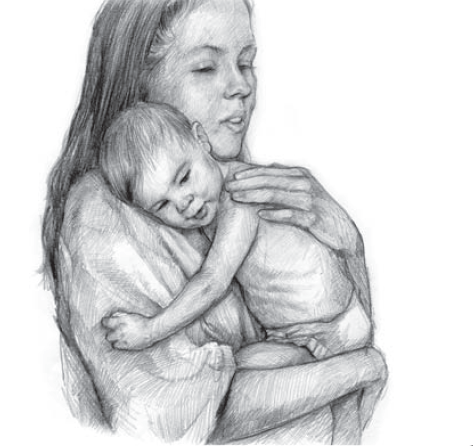Newborns
RSV, Bronchiolitis, and Your Baby
Print, Share, or View Spanish version of this article
 RSV is the short name for respiratory syncytial virus (RES-pruh-tor-ee sin-SISH-ul VYE-ris). Almost all children get RSV at least once before they are 2 years old. For most healthy children, RSV is like a cold. But some children get very sick with RSV.
RSV is the short name for respiratory syncytial virus (RES-pruh-tor-ee sin-SISH-ul VYE-ris). Almost all children get RSV at least once before they are 2 years old. For most healthy children, RSV is like a cold. But some children get very sick with RSV.
Symptoms may include:
-
Runny nose.
-
Coughing.
-
Low fever.
These symptoms should go away in 5 to 7 days. And you can treat them the same way you would treat a cold.
But RSV can be dangerous for some children. It is the main cause of pneumonia
Bronchiolitis is an infection that is common in babies. One symptom of bronchiolitis is trouble breathing. This can be scary for both parents and children.
Call the Doctor Right Away If…
…your baby shows any of these signs:
-
Trouble breathing or breathing faster than usual
-
Wheezing
* -
Acting fussy and restless
-
Not wanting to eat
Call 911 or an Ambulance If…
-
Your baby’s lips and fingertips start to turn blue.
-
Your baby stops breathing.
What Will the Doctor Do?
The doctor will check to see what the infection is. Then the doctor will talk with you about the best way to care for your baby. If your baby is very sick, the doctor may need to keep him or her in the hospital for a few days.
Home Treatment
You can’t cure a virus. But you can help your baby’s symptoms.
To Help a Stuffy Nose
Thin the mucus (MYOO-kus). Only use saline (saltwater) nose drops.
Clear your baby’s nose with a suction bulb. (This is also called an ear bulb.) Squeeze the bulb first and hold it in. Gently put the rubber tip into one nostril
Put a cool-mist humidifier in your child’s room.
A humidifier (hyoo-MID-uh-fye-ur) puts water into the air to help clear your child’s stuffy nose. Be sure to clean the humidifier often.
Don’t give your baby any cold medicines without asking the doctor.
To Help Fever
Give your baby acetaminophen
Don’t give aspirin to your baby. It’s dangerous for children younger than 18 years.
Make Sure Your Baby Drinks Lots of Liquids
Your baby needs to drink plenty of liquids if he or she has a fever or has trouble sucking or nursing.
Your baby may want clear liquids instead of milk or formula. Good choices are water and juice mixed with water. Offer a little bit at a time. Your baby may feed more slowly or not feel like eating because it’s hard to breathe.
Who Can Get Very Sick?
RSV can be serious for babies whose lungs are not strong. These include:
-
Babies younger than 6 weeks.
-
Babies who were born more than 8 weeks early (before 32 weeks of pregnancy).
-
Babies who were born with severe heart or lung disease.
RSV also can be serious for young children with health problems like:
-
Chronic (long-term) lung disease.
-
Serious heart problems.
-
Problems fighting infections because their immune system does not work well.
When and How Does RSV Spread?
RSV and other viruses are very easy to catch. Children can pick up germs from:
-
Countertops, tables, and playpens.
-
Unwashed hands.
-
Touching or kissing someone with a cold.
Can You Prevent RSV?
It’s important to try to protect your child from RSV and other viruses. This is especially true when your child is younger than 6 months. Here are some things you can do:
-
Make sure everyone washes their hands before touching your baby.
-
Keep your baby away from anyone who has a cold, fever, or runny nose.
-
Don’t take your baby to crowded places like shopping malls.
-
Don’t smoke around your baby.
-
Keep your baby away from cigarette and other tobacco smoke.
For Babies Who Can Get Very Sick…
Ask your child’s doctor if your baby is at high risk for getting very sick from RSV. If so, follow the tips above and ask the doctor if your baby should get special shots that can help prevent RSV.
Remember Flu Shots
All babies older than 6 months should get a flu shot. And make sure the whole family gets the flu vaccine too!



